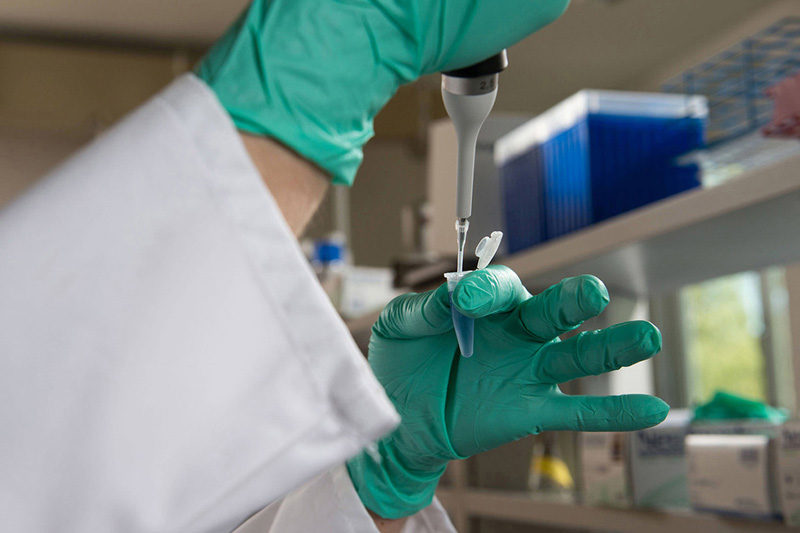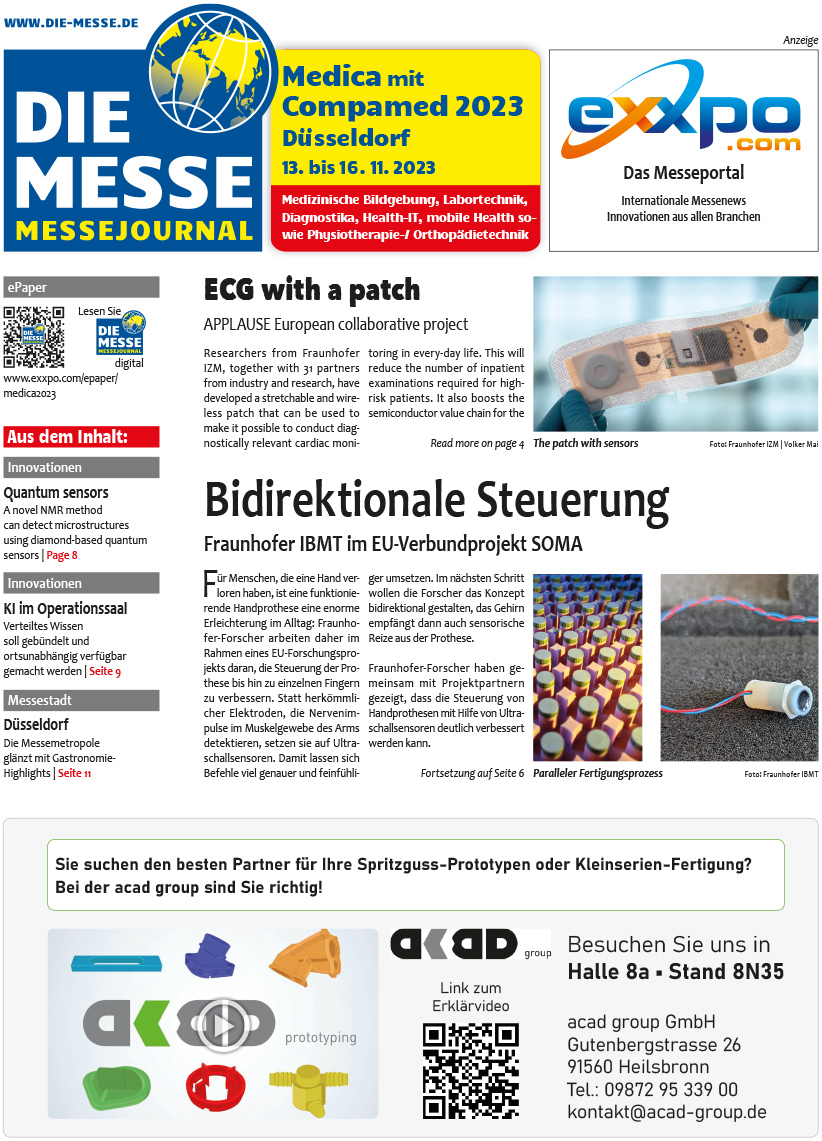12 November 2018
They have developed a method to overcome this fear, which is reported in the journal Management Science. “It is a fundamental assumption in economics that decision-makers welcome information. The more knowledge they have, the better it is,” Nora Szech, holder of the Chair of Political Economy, explains. “If the decision is of fundamental importance to one’s own life, however, this is not always true,” the economist continues. As an example, she mentions patients that may possibly be affected by a serious disease. “They often shy away from the diagnostic test.” To solve this problem, Szech has developed a method that provides the patients with an alternative to the often feared precise tests.
“Many fear to lose hope”
Shying away from diagnosis reduces options of prevention and of adapting life. An example: The incurable hereditary disease Chorea Huntington has been predictable with the help of genetic tests for decades already. If one parent is affected, the descendants have a risk of 50 per cent of being affected by the same disease at the age of about 40. The genetic defect causes most severe physical and psychic damage, such that the patients will need full-time care after a while. Empirical studies reveal that patients change their life drastically as soon as they know that they will remain healthy or fall ill. Professional, financial, and family plans are adapted accordingly. “Still, most risk patients decide against the test,” Szech says. “People do not want to live with the burden of knowing that the disease will break out,” Nikolaus Schweizer of Tilburg University adds. The reason for refusing tests typically is a reaction that anticipates future experience: “If I am 20 years old and get the information that I will fall ill at the age of 40, this will strongly affect my well-being in the next healthy years already,” Szech explains. “Many fear to lose hope.” To cope with this problem, the economist uses findings of behavioral economics and psychology. Earlier studies of moral behavior by Szech focused on the unfavorable effects of diffusion or spreading of responsibility. “Whoever can hide behind others will behave more recklessly and greedily,” she found.
When having to choose between winning money or saving the life of a mouse, test persons more often decided in favor of the former option when the decision was made jointly in a group. If the persons were solely responsible and alone, they mostly refused the money and saved the mouse. “Group decisions are based on logics, the decision might have been made by another person in the group.” When fearing a bad diagnosis, however, the power of diffusion can be used positively. This is demonstrated by Schweizer’s and Szech’s new test methods: “If, for example, the samples of two risk patients are mixed, the test loses part of its horror.” If the genetic defect does not exist, both patients will be relieved. They will remain healthy and can organize their lives accordingly. They may give birth to children without being afraid of the disease and of passing it on to them. They can choose their job accordingly or make old-age provisions. If the genetic defect exists, however, it remains unclear who has the defect or whether both patients have it. “The individual has a chance of 33 per cent of not coming down with Chorea Huntington,” Szech explains.
Randomized methods
Such a result may be worse than the initial situation when the risk of falling ill was 50 per cent, Szech admits. “But there is still good reason for hope to remain healthy.” Randomized methods might also help lower the barrier to testing, because many people, according to empirical studies, have a somewhat distorted picture of probabilities, Schweizer adds. “A clear diagnosis and all-clear signal are very good for the well-being. This is what the new methods offer without the feared risk of learning that the disease will inevitably break out in the future.”
According to Szech, tests using mixed blood samples have already been made in many countries, but in a different context. Examples are examinations of donated blood or for the military sector, where diseases were to be excluded in order to save costs. Szech does not see any legal or ethic obstacles to such tests in Germany. The deliberately less precise tests can also be carried out for individuals when randomizing the evaluation of the sample.
http://www.kit.edu/
Medical tests with less fear
Many people shy away from going to the doctor’s, because they are afraid of unpleasant truths, such as the diagnosis of a disease. Researchers of Karlsruhe Institute of Technology (KIT) and Tilburg University, Netherlands, want to reduce fear with alternative test methods.
 Photo: Patrick Langer, KIT Photo: Patrick Langer, KITMany people shy away from diagnostic tests. Pool samples might rMany people shy away from diagnostic tests. Pool samples might reduce fear.educe fear. |
“Many fear to lose hope”
Shying away from diagnosis reduces options of prevention and of adapting life. An example: The incurable hereditary disease Chorea Huntington has been predictable with the help of genetic tests for decades already. If one parent is affected, the descendants have a risk of 50 per cent of being affected by the same disease at the age of about 40. The genetic defect causes most severe physical and psychic damage, such that the patients will need full-time care after a while. Empirical studies reveal that patients change their life drastically as soon as they know that they will remain healthy or fall ill. Professional, financial, and family plans are adapted accordingly. “Still, most risk patients decide against the test,” Szech says. “People do not want to live with the burden of knowing that the disease will break out,” Nikolaus Schweizer of Tilburg University adds. The reason for refusing tests typically is a reaction that anticipates future experience: “If I am 20 years old and get the information that I will fall ill at the age of 40, this will strongly affect my well-being in the next healthy years already,” Szech explains. “Many fear to lose hope.” To cope with this problem, the economist uses findings of behavioral economics and psychology. Earlier studies of moral behavior by Szech focused on the unfavorable effects of diffusion or spreading of responsibility. “Whoever can hide behind others will behave more recklessly and greedily,” she found.
When having to choose between winning money or saving the life of a mouse, test persons more often decided in favor of the former option when the decision was made jointly in a group. If the persons were solely responsible and alone, they mostly refused the money and saved the mouse. “Group decisions are based on logics, the decision might have been made by another person in the group.” When fearing a bad diagnosis, however, the power of diffusion can be used positively. This is demonstrated by Schweizer’s and Szech’s new test methods: “If, for example, the samples of two risk patients are mixed, the test loses part of its horror.” If the genetic defect does not exist, both patients will be relieved. They will remain healthy and can organize their lives accordingly. They may give birth to children without being afraid of the disease and of passing it on to them. They can choose their job accordingly or make old-age provisions. If the genetic defect exists, however, it remains unclear who has the defect or whether both patients have it. “The individual has a chance of 33 per cent of not coming down with Chorea Huntington,” Szech explains.
Randomized methods
Such a result may be worse than the initial situation when the risk of falling ill was 50 per cent, Szech admits. “But there is still good reason for hope to remain healthy.” Randomized methods might also help lower the barrier to testing, because many people, according to empirical studies, have a somewhat distorted picture of probabilities, Schweizer adds. “A clear diagnosis and all-clear signal are very good for the well-being. This is what the new methods offer without the feared risk of learning that the disease will inevitably break out in the future.”
According to Szech, tests using mixed blood samples have already been made in many countries, but in a different context. Examples are examinations of donated blood or for the military sector, where diseases were to be excluded in order to save costs. Szech does not see any legal or ethic obstacles to such tests in Germany. The deliberately less precise tests can also be carried out for individuals when randomizing the evaluation of the sample.
http://www.kit.edu/
More news about "Medica":
21 September 2020
MEDICA and COMPAMED 2020 to be launched as ‘virtual.MEDICA’ and ‘virtual.COMPAMED’
MEDICA 2020 and COMPAMED 2020, the world-leading information and communication platforms for the medical technology industry and supplier industry for the medical technology industry, will take place entirely online from 16 to 19 November. Within the framework of 'virtual.MEDICA' and 'virtual.COMPAMED', decision-makers from all sectors of the healthcare industry can then expect a comprehensive range of products and services at virtual.MEDICA.de and virtual.COMPAMED.de consisting of three focal areas: The Conference Area (conference and forum program), the Exhibition Space (for exhibitors and product innovations) and the Networking Plaza (networking/ matchmaking). The next events, MEDICA 2021 and COMPAMED 2021, will be held as a hybrid event next year. The hybrid concept consists of combining live platforms for professional visitors to the Düsseldorf trade fair centre and digital offers. (more…)2 July 2020
The MEDICA, the world’s leading medical trade fair held in Düsseldorf, was one of the very first events across all industries to offer young companies in their founding phase special programme formats to present their concepts many years ago. It has subsequently become the international number one for health start-ups too. The creative and predominantly digitally driven start-up scene will be the centre of attention once again at MEDICA 2020 (run time: 16 to 19 November). This is because, following the Corona pandemic, mobile and easily applicable solutions for linking the actors in the healthcare system have become even more important. (more…)19 June 2020
Globally, no sector has been placed under the magnifying glass more than the healthcare sector due to the Corona pandemic. Hospitals, outpatient clinics, practice-based physicians and care facilities have experienced a sudden increased demand for medical and laboratory technology, a wide variety of medical products, digital health applications and, most of all, personal protective equipment. Under these conditions, the plans for the world’s biggest medical trade fair MEDICA 2020 and the number one trade fair for suppliers of the medical technology industry, COMPAMED 2020, held in parallel, are revving up to full throttle. Both events will take place from 16 to 19 November in Düsseldorf – closely interlinked with extensive digital offers and services. (more…)8 March 2019
Messe Düsseldorf India has acquired the FAMDENT Shows, one of the leading Indian fairs for dental medicine. This means the event will become a member of the MEDICAlliance, the umbrella brand for all global healthcare exhibition activities of the Messe Düsseldorf Group. (more…)28 January 2019
Medical Fair India with new “rehaindia” feature
From 21 – 23 February 2019 the Indian health industry elite will meet at the 25th Medical Fair India at the Pragati Maidon Exhibition Center in New Delhi. A new feature this year is rehaindia (powered by Rehacare) with ranges for rehabilitation and nursing care. (more…)
| FAIR NAVIGATOR PHARMA / MEDICAL TECHNOLOGY | |
|---|---|
|
| E-PAPER MEDICA |
 |
